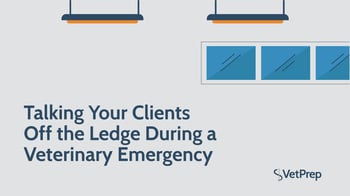Imagine the following scenario:
You have just started your first job as a vet, working at a two-doctor general practice in a suburban area. You’ve been on the job for about three weeks and everything is going smoothly… so smoothly, in fact, that your boss leaves you to “hold down the fort” for a few hours while he goes to a doctor’s appointment. You feel honored, but slightly terrified.
Sure enough, not even half an hour after the owner walks out the door, a new client comes rushing in with a dog that has been hit by a car. You perform a brief triage exam and the dog looks relatively stable, but you know that he needs an IV catheter, fluids, pain meds, radiographs, and monitoring for the next several hours. As soon as you begin talking to the client about your exam findings and plan, she starts to cry. “I only have $75. I won’t have any more money until I get paid on the first of the month. Can you still save him?!”
Uh oh. You were prepared for a medical conversation, but vet school didn’t prepare you for this!
How will you treat this dog for only $75? How can you help this client come up with more money? Your first instinct is to pass this conversation off to another team member, but you’re standing in front of the client and she’s pleading for answers… walking away and handing her off to someone else doesn’t seem like a good choice.
What next?


